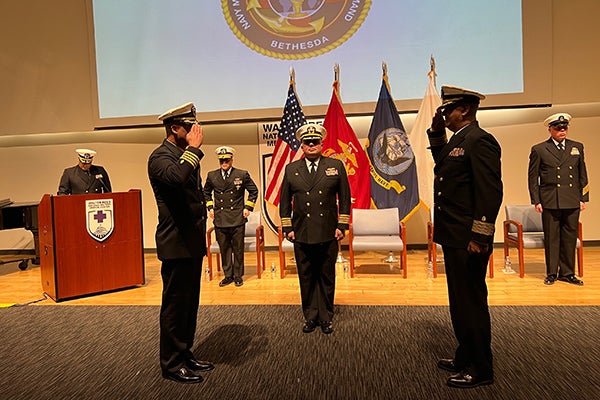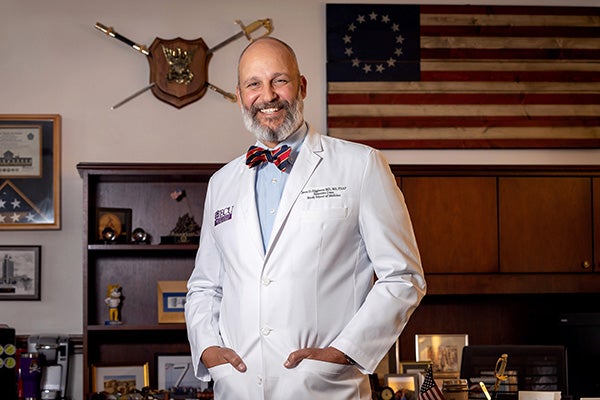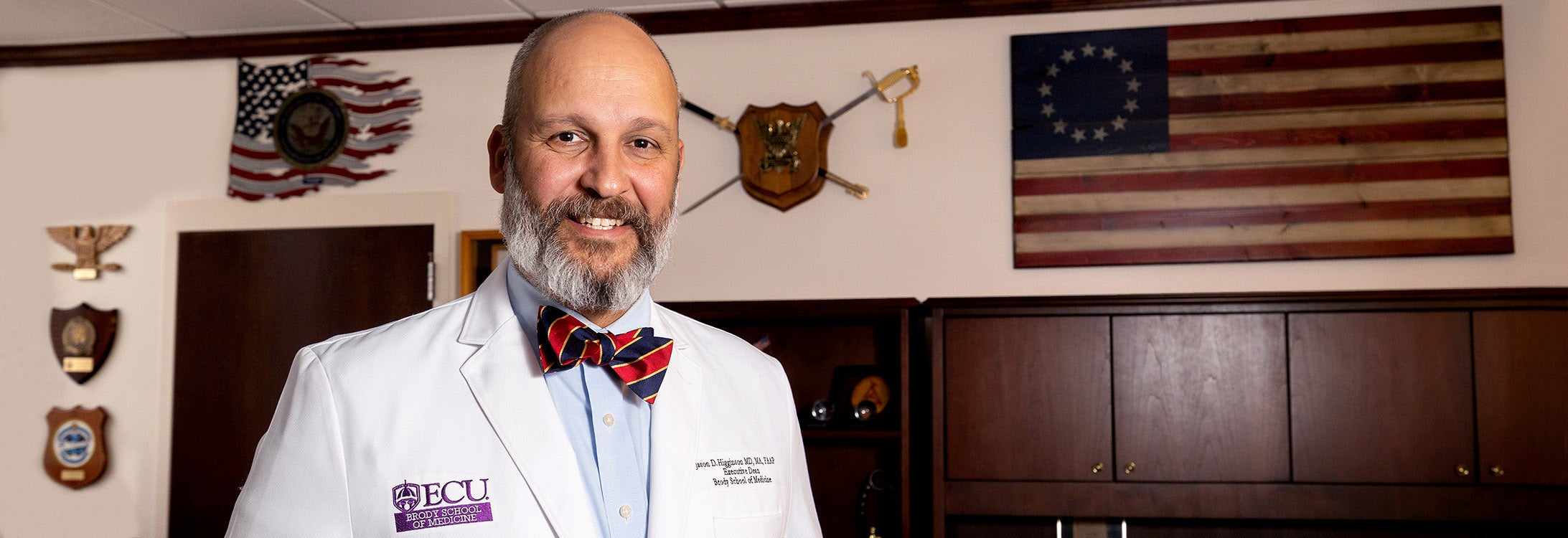TAKING COMMAND
ECU’s Higginson advances medical, military mission
For someone who claims to not believe in multitasking, Jason Higginson certainly excels at it.
In addition to serving as executive dean of East Carolina University’s Brody School of Medicine, Higginson also serves as the chief health officer for ECU Health, as a practicing physician in the neonatal intensive care unit of ECU Health Medical Center, as a professor of pediatrics, bioethics and interdisciplinary studies at Brody, as a captain in the U.S. Navy Reserve, as chair of the medical executive committee for the Navy Reserve, and as husband and father of two.
On Jan. 21, he took on yet another role when he took over command of the U.S. Navy Reserve’s Navy Medicine Readiness and Training Command in Bethesda, Maryland.
The new role is a two-year assignment, during which Higginson — who joined the Reserves in 2012 after 13 years of active duty — will oversee a pool of physicians, nurses and other health care professionals who are available for the Navy to deploy for worldwide contingency support. The Navy often relies on Reserve forces for such personnel because of the eclectic mix of specialties they represent. Higginson will help ensure those assigned to duty are trained and equipped to serve at a moment’s notice.

Higginson was installed in the Navy Reserve Navy Medicine Readiness and Training Command–Bethesda during a Jan. 21 ceremony in Bethesda, Maryland. (Contributed photo)
“Walter Reed is where I spent a long, long part of my military career,” Higginson said. “It is a privilege to be able to go back and be in charge of an organization that’s dedicated to saving someone’s life who’s really contributing to that overall effort. I am excited to be back at the place that shaped me most as a Naval officer.”
Higginson said he will approach his new role with the same determination and commitment that he puts toward succeeding in his other professional and personal responsibilities, without detracting from duties.
“There is no such thing as multitasking. You’re doing individual tasks in a series. So you just have to be intentional about focusing on the individual task that is in front you. It’s about structuring your day to meet all those obligations,” Higginson said. “I just focus on getting (the) mission done. That’s the military part of me; you’re handed a mission, you do it.”
However, Higginson said his military responsibilities were more of an enjoyable outlet for him — like golf is for other people — rather than another “job.”
“This is sort of my external hobby that keeps me fresh,” Higginson said. “I enjoy it; it’s not really a sacrifice. I also think it adds to the job of being executive dean.”
A family affair
Higginson credits a team approach for his ability to “be all in” on the individual tasks in front of him and effectively balance family life with work and military duties.
His wife, Amanda Higginson, also an accomplished multitasker, is currently serving as interim associate dean for student affairs at Brody while attending law school at Syracuse University as a Tillman Scholar. They have two children, Callan, 14, and Ellory, 9.
When he deployed during the COVID-19 pandemic, Higginson said he hesitated about leaving his family, but his wife led by example on the home front.
“As is always the case, she marched on and showed she could do it all with or without me, and she expressed how much she valued my service and commitment to our country,” Higginson said during the Change of Command Ceremony at the Walter Reed National Military Medical Center in Bethesda on Jan. 21. “Her approach enabled me to give my best while deployed and was a significant contribution to the mission.
A history of determination and excellence also serve as the foundation for the family. One reason Higginson is dedicated to military medicine is his father-in-law’s service and sacrifice after being shot in Vietnam and paralyzed.
“He would have died had it not been for competent military people who do what I do, which is take care of people,” Higginson said. “I’ve never heard him complain. He’s fiercely patriotic about his service, but also about ours.”
Higginson said his mother and in-laws are also part of this team approach, helping with things like cooking meals, childcare and homework.
“I don’t take too much home with me,” he said, “and then when I get home, I’m fully engaged in family life, whether it’s playing with the dogs or playing with the kids, and I have dinner with the family every night.”
This team approach was critical after he was diagnosed with an aggressive form of prostate cancer — the same type of cancer that took his father’s life — while deployed in 2021, shortly before accepting the role as executive dean. He focused on completing his deployment and then returned home to begin treatments, which have been successful.
“You know, life is pretty short, and you don’t know how long it’s going to be,” he said. “And so you can make the most of the time that you have, or you can sit and worry about it. I’m an optimist, and in the end, I just feel blessed that I’m alive. I’m in this great place, in this great country, with these great resources.”
He said that choosing to balance the responsibilities he has isn’t about overextending oneself — instead, it’s a matter of learning more about oneself in the process of moving beyond current capabilities.
“I do think that people are more capable than they recognize,” Higginson said. “Success in life comes from stretching yourself from pushing beyond your comfort zone. You truly find out what you’re capable of. And that’s the only pathway to excellence.”
A shared mission
While weighing his options on where to relocate after active duty, Higginson kept pushing ECU to the top of the list.
As a landing spot for Higginson to practice, lead and encourage others to move beyond their comfort zones to succeed, ECU is a storied institution when it comes to supporting the military.

Higginson joined the Navy Reserves in 2012 after 13 years of active duty. (ECU photo by Rhett Buter)
Last year, ECU ranked as a top university for U.S. veterans and military service members; it was named 26th in the Southeast on the list of 2022 Military Times Best for Vets schools. ECU is the only four-year university in North Carolina with a VetSuccess on Campus counselor to help student veterans transition from the military to college life. ECU was honored by the Department of Defense in 2010 with the Secretary of Defense Employer Support Freedom Award, the highest recognition given by the U.S. government to employers for their outstanding support of employees who serve in the National Guard and Reserve.
“It is highly supportive of reservists, meaning that we have policies and procedures in place in the state of North Carolina, and as a state institution, that allow you to do a certain amount of military duty every year,” he said. “So that was one of the reasons I chose ECU as I thought, ‘I’m going to continue my military career.’ As a reservist, I want to go to an institution that supports reservists. For the 10 years that I’ve been at ECU, I’ve deployed twice, and ECU has been very good to me and making sure that serving the country has not been an impediment to maintaining my role and position here.”
Working for such a military-friendly university makes Higginson’s balancing act more manageable and even more rewarding. Helping lead Brody and ECU Health adds another dimension to meeting the mission as well.
“Our mission is laid out to create a group of physicians from diverse backgrounds,” he said, “and we do that as well as improve the health of eastern North Carolina.”
What’s key to those mission is the teamwork involved, Higginson said, adding that the community spirit contributes to good things happening. His newest military role is also an example of the good that can come from teamwork and persistence.
Higginson’s experience in the Navy and the Navy Reserve have added a level of depth to his medical career, something he credits to the people he served with and learned from. For him, performance comes down to the mission in his military role, as it does in medicine.
“As I think about what it means to take command, I always turn to the mission for guidance and motivation,” Higginson said during the Change of Command Ceremony. “We will continue to deliver operational medical capabilities to our Sailors and Marines knowing our role is to provide medical power in support of Naval superiority. Medicine is an important component of our nation’s military strength. I look forward to advancing the important mission we share.”
